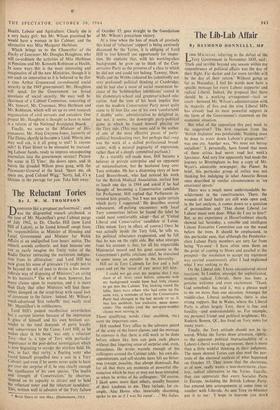The Reluctant Tories
By J. W. M. THOMPSON ISMISSED like a pregnant parlourmaid': such
was the disgruntled remark attributed, at the time of Mr. Macmillan's great Cabinet purge of July 1962, to Dr. Charles Hill (now Lord Hill of Luton), as he found himself swept from his responsibilities as Minister of Housing and Local Government and Minister for Welsh Affairs at an undignified four hours' notice. The remark sounds authentic, not least because'one can so easily imagine the fruity voice of the Radio Doctor extracting the maximum indigna- tion from its alliteration: and Lord Hill has now given his sense of grievance ('it ought not to be beyond the wit of man to devise a less incon- siderate way of disposing of Ministers') an airing in his memoirs.* The wit of man, however, has many claims upon its resources, and it is more than likely that other Ministers will find them- selves dumped on the scrap-heap with equal lack of ceremony in the future: indeed, Mr. Wilson's much-advertised 'first reshuffle' may easily rival Mr. Macmillan's in ruthlessness.
Lord Hill's pained recollection nevertheless has a current interest because of the impression it gives of himself and his own hesitant sur- render to the total demands of party loyalty and subservience to the Cause. Lord Hill, as he makes clear in his book, was only a reluctant Tory—that is, a type of Tory with particular importance in the post-defeat investigation which is now beginning to occupy the stricken field. He was, in fact, that rarity, a floating voter who found himself propelled into a seat in a Tory Cabinet; and even if he seems never quite to have got over the surprise of it, he sees clearly enough the significance of his own species. 'The health and strength of Conservatism,' he observes. depend on its capacity to attract and to hold the reluctant voter and the reluctant candidate.' This, written well in advance of the Tory failure * BOTII SIDLS or TUE Hu.L. (Heinemann,, 35s.)
of October 15, goes straight to the foundations of Mr. Wilson's precarious victory.
At a time when the loss of much of precisely this kind of 'reluctant' support is being anxiously discussed by the Tories, it is obliging of Lord Hill to trot himself out opportunely for inspec- tion. He explains that, with his working-class background, he grew up to think of the Con- servative Party as the preserve of a class to which he did not and could not belong. Tawney, Shaw, Wells and the Webbs coloured his (admittedly not very profound) political thinking at Cambridge, and he had also a sense of social resentment be- cause of the 'hobbledehoy inhibitions' rooted in his elementary-school and grammar-school edu- cation. And the tone of his book implies that even the modern Conservative Party never quite came to fit him like one of his own 'comfortable if shabby' suits: administration he delighted in, but not, it seems, the downright party-political game in which he found himself playing on the Tory side. (This may seem odd in the author of one of the most effective pieces of party- political broadcasting ever, but perhaps that coup was the work of a skilled professional broad- caster, with a natural pugnacity of expression, rather than of a deeply committed partisan.) As a sturdily self-made man, Hill became a believer in private enterprise and an opponent of nationalisation, but he hesitated long over Tory attitudes. He has a disarming story of how Lord Beaverbrook, who had noticed his work for the British Medical Association, invited him to lunch one day in 1944 and asked if he had thought of becoming a Conservative candidate for Parliament. Hill replied that Parliament in- terested him greatly, 'but I was not quite certain which party I supported.' He describes several subsequent, off-putting encounters with local Tory committees before he found the label he could most comfortably adopt—that of 'United Liberal and Conservative' candidate at Luton.
(This meant Tory in effect, of course.) Once he was actually inside the Tory fold, he tells us, his political reluctance evaporated, and he felt that he was on the right side. But what emerges from his account is that, for all his respectable Ministerial record and his great success as the Government's public relations chief, he remained in some sense an outsider in the hierarchy.
Hill sat in Tory Cabinets for five and a half years and yet the 'sense of awe' never left him :
I could not get over my surprise that I was there at all. Sixty years before, someone with
my background would have had little chance to get into the Cabinet. Yet, looking round the table, there were others who had come up the same way, a reminder of how the Conservative Party had changed in the last decade or so. It was less snobbish, less exclusive, more demo- cratic. The middle (and the not-quite-middle) classes were moving, in.
Those qualifying words (`less' snobbish. etc.) seem the important ones.
Hill reached Tory office in the advance guard of the army of the lower classes, and the message he conveys is that there is still work to be done before others like him can gain such places without that lingering sense of surprise and, even, uneasiness. He writes warmly enough of his colleagues around the Cabinet table: his own dis- appointments and self-doubts have left no bitter- ness (except, possibly, that abrupt dismissal). But for all that there are moments of powerful illu- mination which he may or may not have intended, as when he writes of his colleagues: 'Of course, I liked some more than others, usually because of their kindness to me. They *luck, for ex- ample, Alec Home who, invariably charming, spoke to me as if 1 was his equal . . .' My italics.


































 Previous page
Previous page